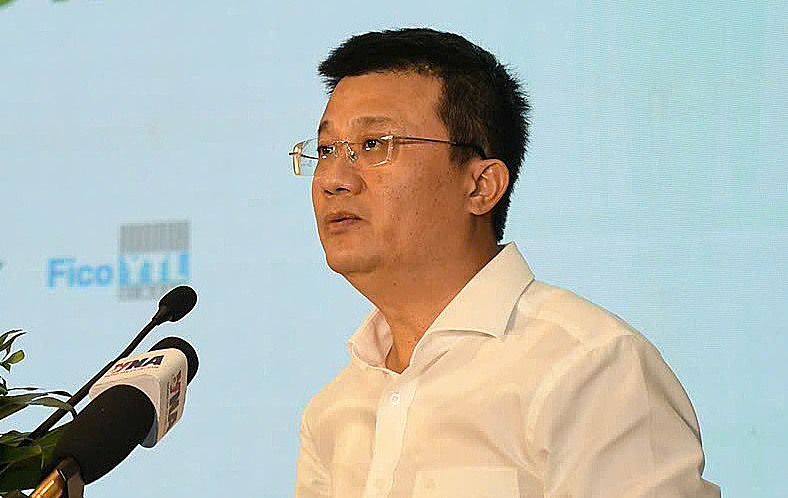This information was shared by Dr. Nguyen Tuan Quang, Deputy Director General of the Department of Climate Change (Ministry of Natural Resources and Environment), at the Vietnam Net Zero 2025 Forum on 18/7.
Quang stated that the Ministry of Finance has submitted a draft decree on the domestic carbon credit trading platform to the Prime Minister for approval. The platform will operate similarly to a stock exchange, trading two main commodities: emission allowances and carbon credits.
Regarding the international market, the Ministry of Natural Resources and Environment is developing a draft decree on the international exchange of greenhouse gas emission reduction results and carbon credits. This draft will be submitted to the government this year. According to Quang, the legal framework and infrastructure will be "completed by the end of this year for a trial run of the carbon credit trading platform."
 |
Dr. Nguyen Tuan Quang, Deputy Director General of the Department of Climate Change, at the event. Photo: The Leader |
Dr. Nguyen Tuan Quang, Deputy Director General of the Department of Climate Change, at the event. Photo: The Leader
A carbon credit is a tradable permit or certificate that grants the holder the right to emit one ton of CO2 or an equivalent amount of other greenhouse gases.
Le Quang Linh, an advisor at carbon finance company Giant Bard, believes Vietnam has significant potential for developing carbon credit projects by leveraging existing resources. Key solutions include biochar from agricultural waste, biogas recovery for electricity generation from pig farming, and waste-to-energy incineration.
For example, biochar can reduce carbon emissions from waste-to-energy conversion by 10-12% and store carbon in the soil long-term. Vietnam has implemented pilot projects and national-level research on the functionality of this product.
Despite the potential, authorities warn that uncontrolled international trading could lead to a carbon credit shortage for Vietnamese businesses and hinder Vietnam's ability to meet its emission reduction commitments.
The Department of Climate Change explained that international transactions will be adjusted accordingly. Contributions to Vietnam's Nationally Determined Contributions (NDC) will be deducted and counted towards other countries. "Without managing these transactions, we won't be able to fulfill our commitments," Quang said.
Domestic airlines will need 2.3 million carbon credits in the next 5 months to comply with the Carbon Offsetting and Reduction Scheme for International Aviation (CORSIA). Shipping companies also need to reduce emissions in accordance with the UN's international maritime agreement.
Regarding the European Union's Carbon Border Adjustment Mechanism (CBAM), if Vietnam lacks a carbon pricing and credit mechanism, businesses without emission reduction measures will have to pay carbon fees of up to 20-35% of the value of their goods or purchase expensive carbon credits from abroad.
Betty Palard, Vice Chair of EuroCham's Green Growth Committee, also recommended that carbon credit developers limit international trading to prioritize domestic demand, which is expected to increase significantly from 2026.
According to World Bank (WB) statistics, Vietnam has issued over 22 million carbon credits since 2003, with over half issued last year, based solely on verifications by Verra and Gold Standard. Under the Clean Development Mechanism (CDM), Vietnam has been verified and exchanged over 40 million credits.
Thuy Truong












